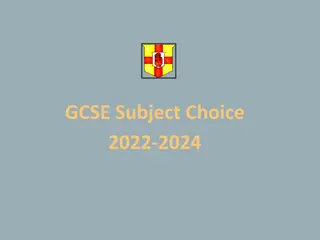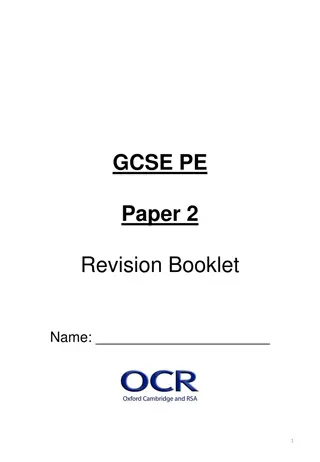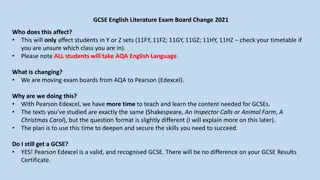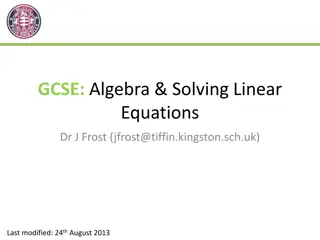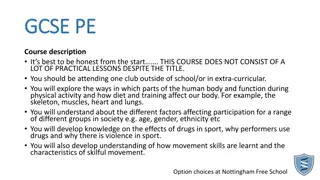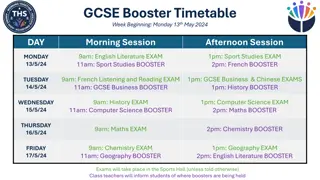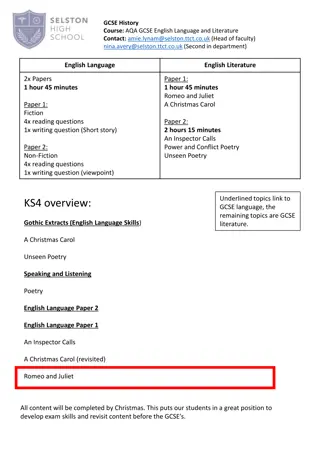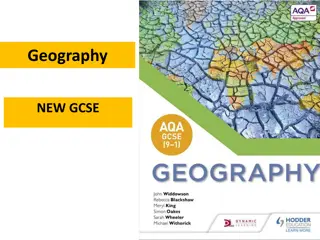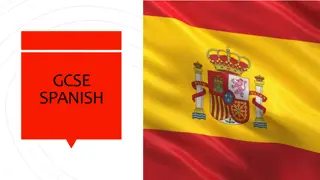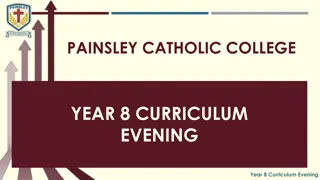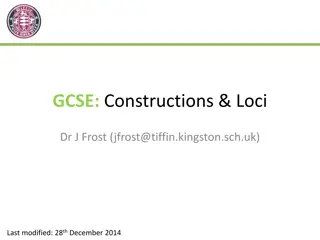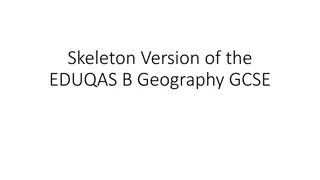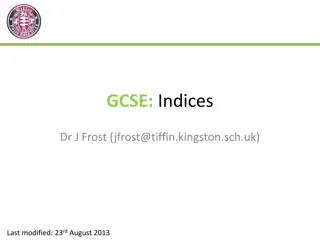Comprehensive Overview of GCSE Physical Education (PE) Curriculum
This detailed overview provides insight into the key components, assessments, and course content of the GCSE Physical Education (8582) program. It covers topics such as applied anatomy and physiology, movement analysis, sports psychology, and socio-cultural influences, preparing students for the written exams and practical assessments at the end of the course in 2022.
Download Presentation

Please find below an Image/Link to download the presentation.
The content on the website is provided AS IS for your information and personal use only. It may not be sold, licensed, or shared on other websites without obtaining consent from the author. Download presentation by click this link. If you encounter any issues during the download, it is possible that the publisher has removed the file from their server.
E N D
Presentation Transcript
GCSE PHYSICAL EDUCATION (8582)
Key Components GCSE PE is a linear course, this means that you will sit all the exams and submit all of your non-exam assessments at the end of the course 2022! 3 Assessments 1. Paper 1: The human body and movement in physical activity and sport 2. Paper 2: Socio-cultural influences and well-being in physical activity and sport 3. Non-exam assessment: Practical performance in physical activity and sport
Paper 1: The human body and movement in physical activity and sport What is assessed? Applied anatomy and physiology Movement analysis Physical training Use of data How it is assessed Written exam: 1 hour 15 minutes 78 marks (a mixture of multiple choice/objective test questions, short answer and extended answer questions) 30% of GCSE
Paper 2: Socio-cultural influences and well- being in physical activity and sport What is assessed? Sports psychology Socio-cultural influences Health, fitness and well-being Use of data How it is assessed Written exam: 1 hour 15 minutes 78 marks (a mixture of multiple choice/objective test questions, short answer and extended answer questions) 30% of GCSE
Course content Theory: Paper 1 Applied anatomy and physiology key body systems and how they impact on health, fitness and sporting performance Movement analysis the basic principles of movement and their effect on sporting performance Physical training the principles of training, different training methods, fitness testing and evaluating training programmes Use of data data analysis in relation to key areas of physical activity and sport
Course content Theory: Paper 2 Sports psychology psychological factors that can affect performance levels in sport Socio-cultural influences society and sport Health, fitness and wellbeing the benefits of participating in physical activity and sport Use of data data analysis in relation to key areas of physical activity and sport
Non-exam assessment (NEA): Practical performance in physical activity and sport What is assessed? Practical performance (player/performer) in 3 different physical activities Analysis and evaluation of performance to bring about improvement in one activity How it is assessed Assessed in school/moderated by AQA 100 marks 40% of GCSE *One activity must be a team activity, one must be an individual activity, and the third can be either team or individual *each activity is marked: 10 marks for skills, 15 marks for full context (game/match etc) *1 activity chosen for analysis (15 marks) and evaluation (10 marks)
NEA (practical assessment): Team activity list Association Football Cricket Badminton Basketball Camogie Dance Gaelic Football Lacrosse Handball Hockey Hurling Netball Rowing Rugby League Rugby Union Squash Table Tennis Tennis Volleyball
NEA (practical assessment): Individual activity list Amateur boxing Cycling Athletics Canoeing/ Kayaking (1) Diving Canoeing/ Kayaking (2) Golf Dance Gymnastics Equestrian Rock Climbing Sculling Skiing Snowboarding Squash Swimming Table Tennis Tennis Trampolining
NEA: Practical Activities BE AWARE We will not be covering all (or even most) of these activities, but a combination of the most appropriate If you choose an activity that is completed off-site, then audio visual evidence is required for all elements of the criteria There are a number of restrictions over the use of certain activities, for example: You cannot use the same activity as a team and an individual activity e.g. Tennis (doubles tennis and singles tennis) Some combinations of activities are not allowed e.g. Rhythmic Gymnastics and Dance Skiing and snowboarding CANNOT be on dry slopes
GCSE PE Lessons Theory Classroom based Linked to practical activities/learning Research, investigation, report/note writing, exam style questions Folder of work produced Preparation for the 2 written exams Practical Practical based Development of ability and aptitude in sporting activities Demonstration of appropriate skills, techniques, game play and understanding Practical will be video recorded for assessment/evidence Preparation for moderation visit
Things to consider If you are thinking about opting for GCSE PE, here are a few things you should be thinking over: Are you able to demonstrate a high level of performance in both practical lessons and the classroom? Are you prepared for all lessons, with the right equipment and kit? Are you open-minded to participate, and perform to a good standard, in a range of practical activities? Are you comfortable working, both in the classroom and in practical lessons, with a range of students? Is sport and physical activity something you are passionate about, show motivation towards, and want to improve in all aspects of? Do you attend school clubs and/or train and compete in sport/activities outside of school?
Things to consider (2) The allocated time to GCSE PE is split (certainly at the start of the course) evenly between theory and practical This is not just an additional opportunity for some more practical lessons (all students will have Core PE on their timetable) skills and techniques are broken down, practiced and repeated, as well as then being videoed You will need to be able to demonstrate an ability to work with all other students, as your performance can impact the performance of others Participation in sport/activities outside of school/lessons is expected This is a great subject for those that have a genuine interest in the areas behind PE, sport and physical activity, and could potentially see themselves being, and working, in this competitive environment!
AQA GCSE PE - Specification For further details about the AQA GCSE PE course use the hyperlink below to direct you to the specification: https://www.aqa.org.uk/subjects/physical-education/gcse/physical- education-8582







